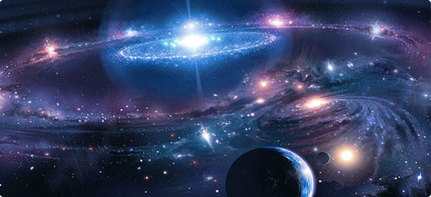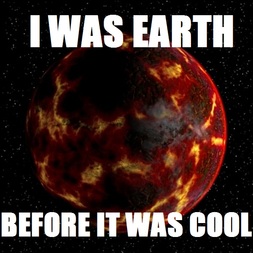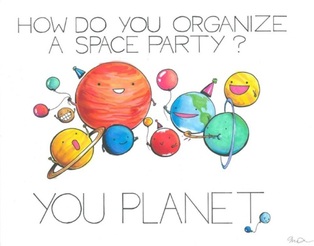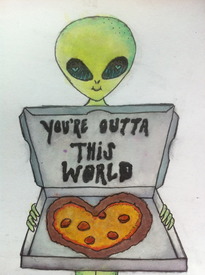Let me begin with a short video about The Big Bang Theory. This wasn't originally what I wanted to show you. I was searching for that certain short video by BBC that our professor showed to the class but I can't find it so this'll have to do. Two minutes lost won't hurt. 'The simlest picture with the big bang starts with nothing.' "The Big Bang theory is an effort to explain what happened at the very beginning of our universe. Discoveries in astronomy and physics have shown beyond a reasonable doubt that our universe did in fact have a beginning. Prior to that moment there was nothing; during and after that moment there was something: our universe. The big bang theory is an effort to explain what happened during and after that moment." "People who have tried to uncover the mysteries of the universe's development include such famous scientists as Albert Einstein, Edwin Hubble and Stephen Hawking. One of the most famous and widely accepted models for the universe's development is the big bang theory." Personally, I don't know much about the Big Bang . So, to make sure that what I'm going to post about the theory are fact-based and nonsense-free, I'm going to turn you over to some articles I found. Big Bang Theory - The Premise According to the standard theory, our universe sprang into existence as "singularity" around 13.7 billion years ago. What is a "singularity" and where does it come from? Well, to be honest, we don't know for sure. Singularities are zones which defy our current understanding of physics. They are thought to exist at the core of "black holes." Black holes are areas of intense gravitational pressure. The pressure is thought to be so intense that finite matter is actually squished into infinite density (a mathematical concept which truly boggles the mind). These zones of infinite density are called "singularities." Our universe is thought to have begun as an infinitesimally small, infinitely hot, infinitely dense, something - a singularity. Where did it come from? We don't know. Why did it appear? We don't know. After its initial appearance, it apparently inflated (the "Big Bang"), expanded and cooled, going from very, very small and very, very hot, to the size and temperature of our current universe. It continues to expand and cool to this day and we are inside of it: incredible creatures living on a unique planet, circling a beautiful star clustered together with several hundred billion other stars in a galaxy soaring through the cosmos, all of which is inside of an expanding universe that began as an infinitesimal singularity which appeared out of nowhere for reasons unknown. This is the Big Bang theory. Big Bang Theory - Common Misconceptions There are many misconceptions surrounding the Big Bang theory. For example, we tend to imagine a giant explosion. Experts however say that there was no explosion; there was (and continues to be) an expansion. Rather than imagining a balloon popping and releasing its contents, imagine a balloon expanding: an infinitesimally small balloon expanding to the size of our current universe. Another misconception is that we tend to image the singularity as a little fireball appearing somewhere in space. According to the many experts however, space didn't exist prior to the Big Bang. Back in the late '60s and early '70s, when men first walked upon the moon, "three British astrophysicists, Steven Hawking, George Ellis, and Roger Penrose turned their attention to the Theory of Relativity and its implications regarding our notions of time. In 1968 and 1970, they published papers in which they extended Einstein's Theory of General Relativity to include measurements of time and space.1, 2 According to their calculations, time and space had a finite beginning that corresponded to the origin of matter and energy."3The singularity didn't appear in space; rather, space began inside of the singularity. Prior to the singularity, nothing existed, not space, time, matter, or energy - nothing. So where and in what did the singularity appear if not in space? We don't know. We don't know where it came from, why it's here, or even where it is. All we really know is that we are inside of it and at one time it didn't exist and neither did we. Big Bang Theory - Evidence for the Theory What are the major evidences which support the Big Bang theory?
Now, for some non-serious matter, here's an earth joke, planets partying after cooling down, and an adorable alien bring them pizza Have a nice week everyone! Checked by Prof. Crisencio Paner
26 Comments
6/18/2012 08:15:49 pm
the rebel jen blogs about the big bang theory huh? i do think that the big bang theory is the most convincing out of all theories. i like the fact that you did try your best to justify. good job!
Jen
6/18/2012 08:22:02 pm
Yup, I'm a rebel gone good (what the hell :)) ) Thanks for the comment!
Jen
6/22/2012 03:06:11 am
NO I:
Jen
6/19/2012 01:09:17 am
Haha! Yes, I like the alien pizza too. Thanks for the comment!
Jen
6/19/2012 02:17:13 am
Aw, I know right? Here, have some alien pizza.
jeorje
6/19/2012 06:01:36 am
hi,
Jen
6/22/2012 03:02:54 am
I'll keep those in mind. Thank you for the comment! :D 6/19/2012 01:37:03 pm
I like the jokes! :) I think the big bang theory is pretty catchy name!
Jen
6/22/2012 03:03:54 am
I think so too. :))
Filip
6/19/2012 01:37:19 pm
Theory is still theory ... there are other theories around regarding how is the universe was formed ... However, the Big Bang Theory is the most acceptable one in our society ...
Jen
6/22/2012 03:08:35 am
I agree. The evidences discovered seems to back up the theory pretty good.
Billie
6/19/2012 11:13:24 pm
This page shows a good representation of all perspective on the subject.
Jen
6/22/2012 03:10:05 am
I'm glad you think so. :D The big bang is a very interesting theory. I had fun researching about it.
flocer
6/20/2012 09:24:01 am
very informative .......
Jen
6/22/2012 03:11:50 am
thank you :D
Mari
6/20/2012 10:17:35 am
I thought it's about the show Big Bang Theory! :). Good job!
Jen
6/22/2012 03:13:58 am
Haha! I watch that show too! I was gonna make a joke about the show and the theory but a friend beat me to it. But I hope you went and read even though It wasn't about the show. ;)
Jen
6/22/2012 03:15:07 am
Thank you! :D
shine
6/23/2012 09:59:28 pm
Theory is still theory. The big bang theory leaves major questions unanswered. One is, what is the original cause of big bang itself, and they say there was really no explosion.... Nice, very informative,
Jen
6/25/2012 08:01:27 pm
Well, it's no shocker that the theory leaves some unanswered questions knowing that the claim is that the theory occurred a million years ago or something.
Asar
8/1/2012 03:23:24 pm
http://www.bbc.co.uk/science/space/universe/question 8/9/2012 03:19:28 pm
Excellent! I admire all the helpful data you've shared in your articles. I'm looking forward for more helpful articles from you. :) Leave a Reply. |
| All of Space and Time |
|




 RSS Feed
RSS Feed